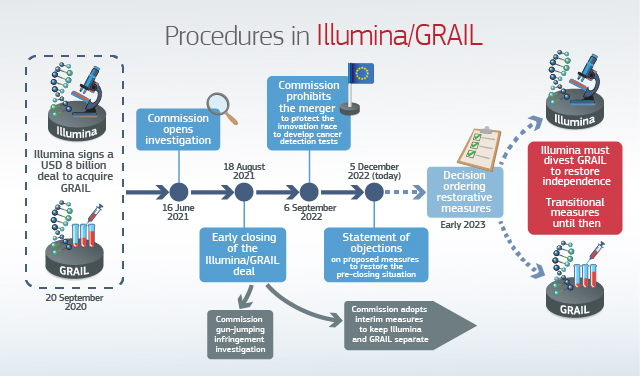Mergers: The Commission adopts a Statement of Objections outlining measures to unwind Illumina's blocked acquisition of GRAIL
The European Commission has sent a Statement of Objections to Illumina and GRAIL informing them of the restorative measures it intends to adopt under the EU Merger Regulation, following the Commission's decision to prohibit the implemented acquisition of GRAIL by Illumina.
On 6 September 2022, the Commission prohibited the acquisition of GRAIL by Illumina over concerns that the merger would have stifled innovation and reduced choice in the emerging market for blood-based early cancer detection tests. Pending the Commission's review, in August 2021, Illumina had already completed its acquisition of GRAIL.
Therefore, Illumina has to unwind the acquisition to give the Commission's prohibition decision its full effect.
In today's Statement of Objections, the Commission sets out the intended restorative measures which include: (a) the divestment measures that the Commission considers Illumina must implement to unwind the transaction with GRAIL and (b) the transitional measures that Illumina and GRAIL need to comply with until Illumina has dissolved the transaction.
Specifically, the divestment measures must be implemented in line with the following principles:
- First, the dissolution of the transaction must restore GRAIL's independence from Illumina, to the same level that GRAIL had prior to the completion of the transaction.
- Second, GRAIL must be as viable and competitive after the divestment as it was before Illumina's acquisition, to ensure that the innovation race between GRAIL and its rivals can continue as before.
- Finally, the divestment must be executable swiftly and with sufficient certainty, so that the pre-transaction situation can be restored promptly.
As regards the envisaged transitional measures:
- They will ensure that Illumina and GRAIL remain separate until the transaction is unwound in order to prevent further integration of GRAIL into Illumina's business and subsequently irreparable harm to competition.
- They also oblige Illumina to maintain GRAIL's viability.
- They will replace the interim measures adopted by the Commission on 28 October 2022 and that are currently in force.
GRAIL and Illumina now have the opportunity to respond to the Commission's Statement of Objections both orally and in writing. After hearing the parties, the Commission may make the divestment and transitional measures binding and Illumina and GRAIL would be legally obliged to comply with them.
In case of non-compliance, the Commission is empowered to impose periodic penalty payments. Moreover, companies failing to comply with interim measures can be fined up to 10% of their annual worldwide turnover under Article 14 of the EU Merger Regulation.
The sending of a Statement of Objections does not prejudge the final outcome of the investigation.
Companies and products
Illumina, headquartered in the US, is a global genomics company, which develops, manufactures and commercialises next generation sequencing (NGS) systems, including sequencing instruments, consumables and related services. Illumina's NGS systems are medical devices used in a variety of applications, including by customers in the oncology space that develop and run blood-based tests that can detect cancer or select appropriate therapies for cancer patients. Illumina's global turnover in 2021 was USD 4.5 billion. In Europe, Illumina commercialises its products both directly and via distributors.
GRAIL, also headquartered in the US, is a healthcare company developing blood-based cancer tests based on genomic sequencing and data science tools. GRAIL's flagship product is “Galleri”, an early multi-cancer detection test, whose purpose is to detect around 50 cancers in asymptomatic patients from a blood sample. In April 2021, GRAIL initiated a limited commercialisation of Galleri in the US. GRAIL has two additional pipeline products: (i) a diagnostic aid for cancer testing used to confirm a diagnosis of cancer in symptomatic patients, and (ii) a minimal residual disease test, to detect potential relapse in patients after cancer treatments. GRAIL was founded by Illumina in 2016, and was spun off later in the same year.
Background
A Statement of Objections is a formal step in an investigation, where the Commission informs the companies concerned in writing of the objections raised against them. The companies can then access the Commission's file, reply in writing and request an oral hearing to present their comments on the case to representatives of the Commission.
The obligation not to implement a notifiable transaction either before its notification or before it has been declared compatible with the common market is laid down in Article 7(1) of the EU Merger Regulation. This standstill obligation prevents potentially irreparable negative impact of transactions on the market, as well as possible irreversible integration of merging parties, pending the outcome of the Commission's merger investigations.
Compliance with the standstill obligation is essential for legal certainty, enables the Commission to conduct a correct analysis of the impact of mergers in the market and prevents the potentially detrimental impact of transactions on the competitive structure of the market. In this way, market forces work for the benefit of consumers.
Article 8(4)(a) of the EU Merger Regulation authorises the Commission to take appropriate restorative measures to restore the situation prevailing prior to the implementation of the concentration where the Commission finds that a concentration has already been implemented and that concentration has been declared incompatible with the internal market.
More information will be available on the Commission's competition website, in the Commission's public register under the case number M.10939.